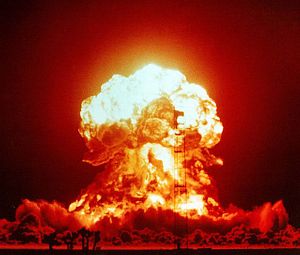“De-alerting” nuclear arsenals could help reduce the likelihood of a cyberattack causing an accidental nuclear war between the United States and Russia, retired U.S. Gen. James Cartwright recently stated in an Associated Press interview.
Short fuses on U.S. and Russian strategic forces have particularly increased the risk of accidental nuclear war, according to Cartwright, while “the sophistication of the cyberthreat [to nuclear weapons] has increased exponentially.”
“One-half of their [U.S. and Russian] strategic arsenals are continuously maintained on high alert. Hundreds of missiles carrying nearly 1,800 warheads are ready to fly at a moment’s notice,” a policy report compiled by a study group chaired by the retired U.S. general summarized.
“At the brink of conflict, nuclear command and warning networks around the world may be besieged by electronic intruders whose onslaught degrades the coherence and rationality of nuclear decision-making,” the report further points out.
The War Games-like scenario could unfold in one of the following three ways:
First, sophisticated attackers from cyberspace could spoof U.S. or Russian early warning networks into reporting that nuclear missiles have been launched, which would demand immediate retaliatory strikes according to both nations’ nuclear warfare doctrines. Second, online hackers could manipulate communication systems into issuing unauthorized launch orders to missile crews. Third and last, attackers could directly hack into missile command and control systems launching the weapon or dismantling it on site ( a highly unlikely scenario).
To reduce the likelihood of such an scenario ever occurring, Cartwright proposes that Moscow and Washington should adjust their nuclear war contingency plan timetables from calling for missiles to be launched within 3 to 5 minutes to 24 to 72 hours.
Reducing the lead time to prepare nuclear missiles for launch would not diminish the deterrent value of the weapons, Cartwright, who headed Strategic Command from 2004 to 2007 and was vice chairman of the Joint Chiefs of Staff before retiring in 2011, emphasized.
However, the Obama White House has so far rejected the idea, particularly due to the recent deterioration of U.S.-Russia relations. Also, Robert Scher, Assistant Secretary of Defense for Strategy, Plans, and Capabilities, testified in Congress this month arguing “it did not make any great sense to de-alert forces” because nuclear missiles “needed to be ready and effective and able to prosecute the mission at any point in time.”
Cartwright’s credibility may have also suffered among Washington policy circles ever since he has been under investigation for leaking information about the top secret Stuxnet virus – a sophisticated cyber weapon allegedly jointly developed by Israel and the United States – to the New York Times.
Nevertheless, a co-authored paper, seen in draft by The Diplomat, argues that “cyber weapons and strategies have brought us to a situation of aggravated nuclear instability that needs to be more explicitly and more openly addressed in the diplomacy of leading powers, both in private and in public.”
The authors, Greg Austin of the EastWest Institute in New York (and a regular contributor to The Diplomat) and Pavel Sharikov of the Russian Academy of Sciences, have concluded that “Russia now sees U.S. plans to disrupt the command and control of its nuclear weapons as the only actual (current) threat at the strategic level of warfare.”
Laura Saalman of the Asia Pacific Research Centre in Hawaii has also warned of the need to look at the impact of U.S. strategies and nuclear force posture on China in a 2014 paper titled “Prompt Global Strike: China and the Spear”.

































